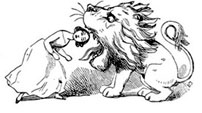
The Dark Side of Self-Sacrifice
GUEST COLUMN
Czar Ivan IV was ambitious, unpredictable, and cruel. He waged ceaseless and unjust wars against neighboring countries, endorsed the Cossack conquest of sleeping Serbia, executed the wives and children of his opponents, and confiscated lands, forcing families into exile. When he heard that a document had been discovered in Novgorod pledging the city’s co-operation with Poland in overthrowing him, he pounced (without waiting to determine if the document was genuine): Shops were burned, merchants’ homes destroyed, farmhouses torn down, monasteries sacked, and thousands massacred.
No one dared to oppose Ivan the Terrible.
Except maybe a fool.
And a fool did. Whereas most of Russia quaked in fear before Ivan, Nicholas of Pskov walked up and rebuked him by slapping a piece of raw and bloody meat into Ivan’s hands, vividly symbolizing Ivan’s sinful butcheries.
Nicholas of Pskov was one of those men known by the Russians as the yourodivyje, the fools in Christ (the word is derived from the word yourod, meaning “something strange”). Fools in Christ were fairly frequent in the 16th-century Russia of Ivan the Terrible. But the phenomenon is well-known throughout the wider Greek Orthodox Church, which venerates six saints as fools in Christ going back at least to St. Simeon of Ernesa (d. 550). (The West, too, has had fools in Christ, such as St. Benedict Joseph Labre in the 18th century.)
The fool in Christ was a person who carried the ideal of self-stripping and humiliation to the limit. He practiced absolute poverty. He had no possessions whatever, wearing rags even in the savage Russian winters, sleeping outdoors in sheds and church porches. Detached and self-forgetting, he expected and anticipated nothing for himself. Most significantly, he renounced possession even of his intellectual gifts, content to be thought deranged by normal society, voluntarily taking up even what has been called “the Cross of madness.”
You May Also Enjoy
Bizarre elements in cases of demonic possession are evidence of supernatural activity, but mostly these elements are subtle and disturbing rather than melodramatic.
Jesse Romero describes his encounters with the supernatural and aims to convince readers of the terrifying power of Satan.
The question of moral evil is not "Why would a good God…" but why would human beings degrade one another and themselves.

